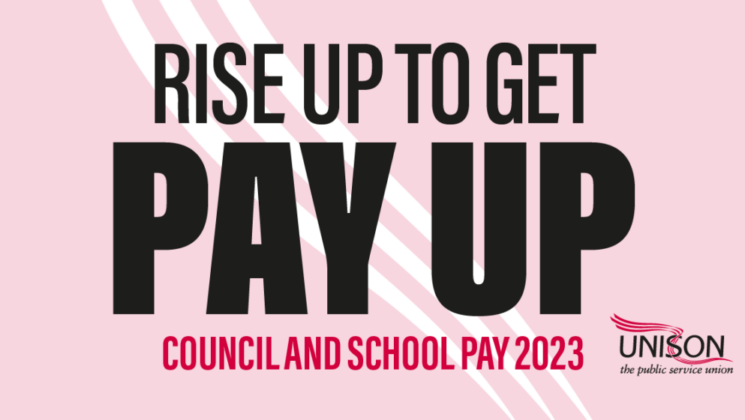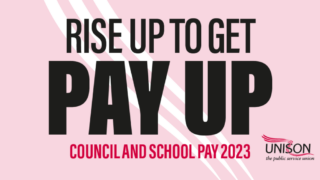It’s with an immense amount of pride that Pam Howard describes the 250,000+ school support staff who UNISON represents: “These are dedicated, professional, qualified people, who are vital to the education of our children.”
That’s why Pam, who is chair of UNISON’s schools committee, is urging all these members to vote in the upcoming NJC strike ballot, which opens on 23 May, when local government and school workers will decide whether to take industrial action over the employer’s latest below-inflation pay offer.
Not only are support staff “directly impacted” by years of inadequate pay, she says, but they can see at first hand the consequences of the Westminster government’s underfunding of councils and schools on children’s education.
“We’re hearing very strong concerns around school funding, and the issues that brings when retaining staff and even recruiting staff. So, school support staff really do need to have their say in this ballot.
“Engaging with the ballot is two-fold. It’s about the individual saying, ‘No, I’m worth more, but I also want my school to be supported, to have adequate funding to pay me to provide these vital services.’ The funding is a massive part of this.”
Schools wouldn’t cope without support staff
Pam, who is also joint branch secretary of the Warrington Local Government branch, is quite clear that schools simply would not function without support staff – not just classroom-based staff, but site staff, those in finance and admin, or involved in pastoral care, and the many other roles that the union represents.
As with so many public service workers, their importance was highlighted by the pandemic, when, for example, TAs went into schools to be with vulnerable or key worker children in person, while teachers were given the means to work online, and caretakers, cleaners and others kept the premises open and functional.
But this extra value existed before the pandemic, and has continued into the cost of living crisis, with staff filling the gaps left by underfunding – both in terms of workload and material contributions.
“We’ve heard stories for many years now, especially in areas where you’ve got issues with deprivation, of children coming into school without breakfast, or coming in with clothes that are probably not adequate for the weather. If a child comes to school like that, they’re not going to be able to learn, so our members feel that they need to help.
“Wherever they can, they’re bringing things in. I’ve known people bring pens, pencils, stationery, that type of thing. They bring food in to provide breakfast, they even bring more of their own packed lunch so they can pass it on to children. I’ve known TAs whose own children have grown out of PE kit, trainers, shoes, things like that, and they know the children who need these things, and they’ll pass them on.
“It’s immense what they do. They’re not only thinking about themselves, turning up to work and being paid, but they’re also constantly thinking about a child’s wellbeing. They’re focusing on the children.”
Exploited
Unfortunately, such dedication can be exploited, whether it’s TAs being effectively used as teachers (saving the school the cost of employing supply teachers), or caretakers who have a trade being used as electricians or plumbers, none of them being paid for utilising their additional skills. And this treatment, allied to poor pay, is having an impact.
“Some of our members are part time, low paid, some of them are single parents, trying to pay their own rent or mortgage, look after their own children,” Pam observes. “But the pay isn’t keeping pace with inflation, and that’s putting a huge pressure on them.
“Alongside that, there is this immense responsibility when you work in a school. These are professional people, and they see themselves as undervalued and underpaid. Many of them can get the equivalent pay working in an environment where they’ve not got that responsibility, they’ve not got all that pressure. I know people who have moved into a similar paid job in a local supermarket that gives term-time friendly hours, or in a company that deals with parcel delivery, where they can get the same pay, basically clocking on, clocking off, less pressure, less hassle, less responsibility.
“And that is what we’re seeing now with many staff, because the pay in schools is not worth the pressure and it isn’t keeping pace with inflation. They’re deciding they can do other things.”
It’s not just about pay
Pam returns to perhaps the biggest victims of the school funding crisis. “Our children have just gone through a pandemic. And the impact on them was enormous. They missed their schooling, they missed their friends, they missed that socialising. Many young people are having issues with poor mental health, and services are not resourced well enough to support them and their families. And my fear is that the impact of very low school funding, and staff feeling that they’re not valued, is that those professionals – who offer such invaluable support to our children – will go elsewhere.
“And that is vital support that we need in schools, not just in the classroom, but every role that supports the school functioning day-to-day.”
Pam concludes: “For me, this isn’t just about pay – although that’s a central issue that must be addressed – it’s about making sure that schools and councils have enough money to provide the vital services that our communities need. And at the top of the list for me is our children’s education. You know, we are in a sorry state if we can’t provide adequate funding to educate our children.”






